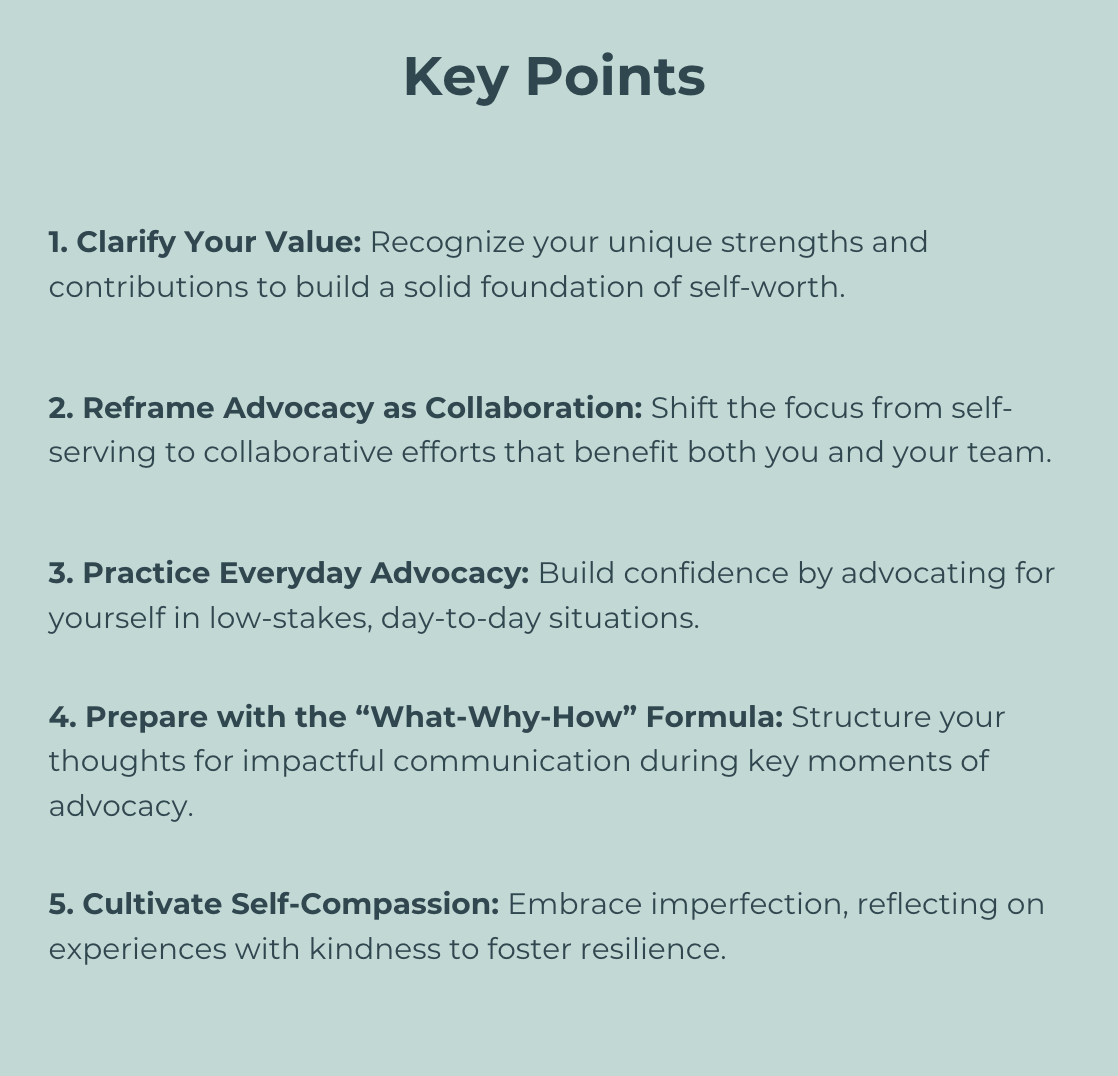From Self-Worth to Self-Advocacy: How Professionals Can Build the Confidence to Speak Up
What to Consider When Reading
How does your sense of self-worth influence your willingness to advocate for yourself at work?
In what ways can self-advocacy create benefits for both you and your team?
Let’s be real—speaking up at work isn’t always easy. Whether it’s pitching a bold idea in a meeting, negotiating for a raise, or setting boundaries with a colleague, using your voice can feel intimidating, especially if you’re unsure of how it will be received. But here’s the thing: speaking up isn’t just about having the courage to talk. It starts much deeper—with your sense of self-worth.
When you know your value, it becomes easier to advocate for yourself. Self-advocacy isn’t about being loud or pushy; it’s about confidently communicating your needs, ideas, and boundaries in a way that feels authentic. Let’s explore the journey from self-worth to self-advocacy and how you can build the confidence to use your voice.
Why Self-Worth is the Foundation of Self-Advocacy
At its core, self-worth is your belief in your inherent value. It’s knowing that you deserve respect, opportunities, and fairness—not because of your job title, accomplishments, or accolades, but simply because you’re you. When self-worth is strong, you don’t feel the need to shrink yourself to fit in, nor do you rely solely on external validation to feel good about your contributions.
This inner sense of value forms the foundation for self-advocacy. Why? Because if you don’t believe in your own worth, it’s hard to convince others to value you. On the flip side, when self-worth is solid, you approach conversations with confidence, knowing that your ideas, needs, and boundaries are worth sharing.
The Barriers to Speaking Up
Before we dive into strategies, let’s address the common reasons people struggle to speak up at work. These barriers aren’t signs of weakness—they’re human experiences many of us face:
Fear of Rejection: What if my idea gets shot down?
Imposter Syndrome: Am I even qualified to say this?
Cultural or Social Conditioning: Have you been taught to prioritize harmony over confrontation?
Overthinking Outcomes: What if I say the wrong thing and ruin my reputation?
Recognizing these barriers is the first step to overcoming them. They’re not flaws; they’re hurdles you can learn to navigate.
The Self-Worth to Self-Advocacy Framework
So, how do you go from recognizing your worth to confidently speaking up? It’s all about small, intentional steps. Here’s a framework to help you along the way:
1. Clarify Your Value: Know What You Bring to the Table
If you’ve ever hesitated to speak up because you’re unsure of your worth, this step is for you. Take time to reflect on your strengths, skills, and contributions. What unique perspectives do you bring to the team? What problems have you helped solve? The more you recognize your value, the more confident you’ll feel advocating for yourself.
How to do it:
Create a Value List: Write down five things you consistently bring to your work environment—things like problem-solving, creativity, or organization. Keep this list handy for moments of self-doubt.
Collect Wins: Start a folder where you save positive feedback, successful projects, and accomplishments. It’s a great confidence booster when you need a reminder of your impact.
Why it works:
When you know what you bring to the table, it’s easier to frame your contributions as essential, not optional.
2. Reframe Advocacy as Collaboration
A lot of people shy away from self-advocacy because it feels self-serving. But here’s a mindset shift: speaking up isn’t about “taking” something from others; it’s about collaborating to create better outcomes—for you, your team, and your organization.
How to do it:
Tie Your Ideas to the Bigger Picture: Instead of saying, “I need more resources,” try, “Investing in these resources will help the team meet its goals more effectively.”
Use “We” Language: Frame your input as part of a collective effort. For example, “We could benefit from...” shows you’re advocating for shared success.
Why it works:
Reframing self-advocacy as a collaborative act removes the guilt or hesitation you might feel about speaking up. It’s not about being pushy; it’s about contributing to the greater good.
3. Start Small: Practice Everyday Advocacy
You don’t have to wait for a big meeting or a major opportunity to start advocating for yourself. Build your confidence by practicing in low-stakes situations.
How to do it:
Share Your Ideas in One-on-One Settings: If pitching to a group feels overwhelming, start by sharing your thoughts with a trusted colleague or manager.
Say “No” to Small Requests: Practice setting boundaries in everyday scenarios, like declining a task that doesn’t align with your priorities.
Why it works:
The more you practice self-advocacy in smaller moments, the more natural it becomes in bigger ones. You’re training yourself to trust your voice.
4. Prepare and Plan Your Words
Sometimes, the hardest part of speaking up is figuring out what to say. Taking time to prepare your thoughts can make all the difference, especially if you’re advocating for something important, like a raise or a new project.
How to do it:
Use the “What-Why-How” Formula:
What: Clearly state what you’re advocating for.
Why: Explain why it matters—both to you and to the organization.
How: Outline how it can be achieved.
For example: “I’d like to take on more leadership opportunities (what). I believe I’ve demonstrated strong problem-solving skills in recent projects (why). Perhaps I could lead the next team meeting as a first step (how).”
Why it works:
Being prepared helps you feel more confident and ensures your message is clear and impactful.
5. Build Allies and Support Systems
Advocating for yourself doesn’t mean you have to do it alone. Having allies—people who believe in your value and support your growth—can give you the extra push to speak up when it matters most.
How to do it:
Find a Mentor: A mentor can provide guidance, encouragement, and even help amplify your voice in the workplace.
Leverage Peer Support: Share your goals with trusted colleagues. Sometimes, having someone cheer you on makes all the difference.
Why it works:
Knowing you have people in your corner can make speaking up feel less daunting. Allies also create a ripple effect, normalizing advocacy within your workplace.
6. Cultivate Self-Compassion
Here’s an important reminder: you won’t get it right every time, and that’s okay. Speaking up is a skill, and like any skill, it takes practice. Be kind to yourself when things don’t go perfectly.
How to do it:
Debrief Without Judgment: After advocating for yourself, reflect on what went well and what you’d like to improve. Focus on growth, not perfection.
Remind Yourself of Your Humanity: Everyone gets nervous or fumbles their words sometimes. It doesn’t diminish your worth or your ability to try again.
Why it works:
Self-compassion keeps you from spiraling into self-doubt after a misstep. Instead, it creates space for learning and resilience.
Wrapping It Up: Your Voice Matters
Speaking up at work isn’t about being fearless or having all the answers. It’s about recognizing your value, trusting your voice, and being willing to share it—even when it feels uncomfortable. Self-advocacy starts with self-worth, and when you build that foundation, the confidence to speak up follows naturally.
So, the next time you hesitate to share your thoughts or advocate for your needs, remind yourself: your voice matters. Not just for you, but for the growth and success of the team and organization you’re part of. Start small, stay compassionate, and watch how your confidence grows with every step. You’ve got this.
Take the First Step Toward your Well-Being
At The Mental Game, we know that navigating life’s challenges requires more than just determination—it requires the right support and strategies tailored to your unique needs. Our team of seasoned professionals is dedicated to helping you build the mental resilience and skills necessary to excel, no matter what life throws your way.
Visit The Mental Game to learn more about our services and schedule your FREE consultation today and take the first step toward a healthier, more resilient mind.

